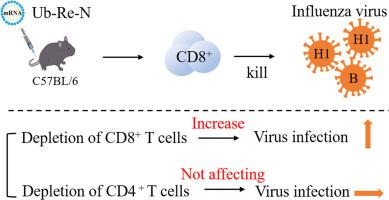A T cell-based ubiquitin-mediated mRNA vaccine provides cross-protection against H1N1 and B influenza viruses in mice
IF 5.8
Q1 MICROBIOLOGY
引用次数: 0
Abstract
Given the persistent antigenic drift of seasonal influenza viruses and the continuous threat of emerging pandemics, there is an urgent necessity to develop novel influenza vaccines capable of conferring broad-spectrum immunity against multiple viral subtypes. CD8+ T cells provide a promising approach to achieving such protection because of their ability to recognize conserved internal antigens. Particularly, the highly cross-reactive internal nucleoprotein of influenza virus demonstrates remarkable efficacy in safeguarding against infection caused by diverse strains. Ubiquitination modification is critical for the differentiation and functionality of CD8+ T cells, thereby modulating the immune response. In this study, three mRNA vaccines were designed using the influenza virus nucleoprotein as an immunogen, including wild-type N protein (WT-N), ubiquitinated wild N protein (Ub-WT-N), and ubiquitinated rearrangement N protein (Ub-Re-N). After immunizing C57BL/6 mice, both WT-N and Ub-WT-N vaccines elicited antibody production, while the Ub-Re-N group exhibited enhanced cellular immune response without inducing antibody production. Subsequently challenged with influenza viruses, the vaccinated mice showed significant protection against mortality and weight loss caused by H1N1 and influenza B strains. Notably, depletion of CD8+ T cells led to a substantial reduction in the protective efficacy of the Ub-Re-N vaccine. In conclusion, the mRNA vaccine encoding Ub-Re-N confers potent defense against influenza virus infection through induction of a robust antigen-specific T cell response.

基于A - T细胞的泛素介导mRNA疫苗对小鼠H1N1和B型流感病毒具有交叉保护作用
鉴于季节性流感病毒的持续抗原漂移和新出现的大流行的持续威胁,迫切需要开发能够对多种病毒亚型提供广谱免疫的新型流感疫苗。CD8+ T细胞提供了一种很有前途的方法来实现这种保护,因为它们能够识别保守的内部抗原。特别是流感病毒高度交叉反应的内部核蛋白,在抵御多种毒株感染方面表现出显著的功效。泛素化修饰对CD8+ T细胞的分化和功能至关重要,从而调节免疫反应。本研究以流感病毒核蛋白为免疫原,设计了三种mRNA疫苗,包括野生型N蛋白(WT-N)、泛素化野生N蛋白(Ub-WT-N)和泛素化重排N蛋白(Ub-Re-N)。在免疫C57BL/6小鼠后,WT-N和Ub-WT-N疫苗均可诱导产生抗体,而Ub-Re-N组可增强细胞免疫反应,但未诱导产生抗体。随后,接种流感病毒的小鼠对H1N1和B型流感病毒株引起的死亡和体重减轻表现出显著的保护作用。值得注意的是,CD8+ T细胞的耗竭导致Ub-Re-N疫苗的保护功效大幅降低。总之,编码Ub-Re-N的mRNA疫苗通过诱导强大的抗原特异性T细胞反应,赋予对流感病毒感染的有效防御。
本文章由计算机程序翻译,如有差异,请以英文原文为准。
求助全文
约1分钟内获得全文
求助全文
来源期刊

Current Research in Microbial Sciences
Immunology and Microbiology-Immunology and Microbiology (miscellaneous)
CiteScore
7.90
自引率
0.00%
发文量
81
审稿时长
66 days
 求助内容:
求助内容: 应助结果提醒方式:
应助结果提醒方式:


